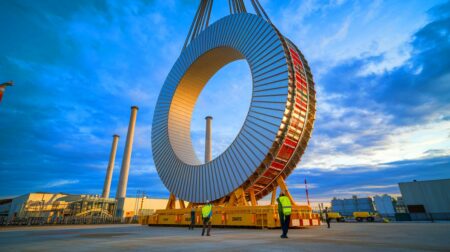Across much of rural Africa a steady supply of electricity remains a luxury. Things are changing, however. Namibia for one is seeking to boost rural electrification through a mini-grid project in collaboration with German universities and a solar company.
“Solar power is now cheaper than electricity from the grid and the PV market in Southern Africa has significant growth potential,” says Albert Engelbrecht, a senior vice president at the company, IBC Solar.
Namibia is hardly alone in its quest for electrification. Many other developing countries around Africa are in the process of increasing their rates of electrification. The trend is spearheaded by solar and PV stations as well as wind farms. All of these are expected to have positive effects on local employment.
“In Nigeria and Kenya the impact of renewable energy jobs is also significant and still growing,” explains Quartz Africa. “Renewable energy companies in Kenya account for 10,000 jobs — only 1,000 fewer than the national utility, while in Nigeria the sector employs 4,000 in formal jobs compared to 10,000 employed across the country’s traditional energy sectors.”
Grinding poverty remains endemic in Africa and electrification is widely seen as a way to lift millions out of it. The continent suffers from “energy poverty” that prevents effective economic growth and perpetuates a cycle of poverty. Two-thirds of the people who live in sub-Saharan Africa, whose total population is around 800 million, have no electricity.
In sub-Saharan Africa “electricity consumption per capita is, on average, less than that needed to power a 50-watt light bulb continuously,” notes the International Energy Agency in its Africa Energy Outlook report. As recently as 2012 the 48 countries in the region generated a mere 90GW of power, an amount that is available for 45 million people in Spain alone.
Hampering electrification has been rudimentary infrastructure across much of Africa where “investors joke about living in a ‘bring-your-own-infrastructure’ continent,” The Economist observes. “Firms must provide independent generators, water purification and even sewage treatment when building a factory or hotel. Of these the costliest is often power.”
Many electrification projects remain isolated and small-scale. They are hardly adequate to power transformative change in the lives of millions without electricity. As a result, the World Bank has been pushing African countries to develop long-term energy plans (including investments) rather than continue to rely on ad-hoc local solutions.
Many experts argue that in addition to embracing renewables nations in sub-Saharan Africa should consider nuclear energy as a long-term option, especially considering developments in improved safety and affordability thanks to a new generation small modular reactors. Such technology remains expensive, however, and that is why developed countries should step up to help developing countries in Africa, they argue.
“One of the most important things is support for developing countries because there are many developing countries that would like to have nuclear power, and we are helping them to create the necessary infrastructure,” says Mikhail Chudakov, deputy director general of the International Atomic Energy Agency and head of the Department of Nuclear Energy.
“This is the most important for the future because these countries do not grow in development the same way as industrial countries – at industrial levels – and do not produce the same amount of CO2 emissions,” Chudakov adds. “For the future, it is the obligation of developed countries to help them. We need to have more or less the same quality of life across the whole planet, and this is one [positive]effect of nuclear power.”
Nuclear power can be a highly effective tool to provide sustainable growth to African countries, experts like Chudakov stress. Yet it is up to nuclear firms and Western countries to provide the necessary financial and technical assistance.
Many African nations themselves are keen to embrace nuclear. A third of the almost 30 countries currently considering nuclear power are in Africa, the IAEA notes. “Egypt, Ghana, Kenya, Morocco, Niger, Nigeria and Sudan have already engaged with the IAEA to assess their readiness to embark on a nuclear programme,” the agency says. “Algeria, Tunisia, Uganda and Zambia are also mulling the possibility of nuclear power.”
Did you like it? 4.7/5 (23)








